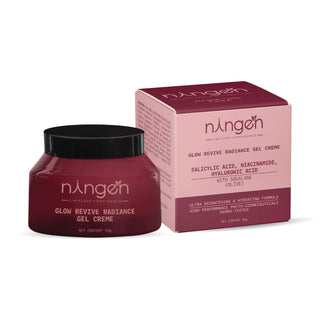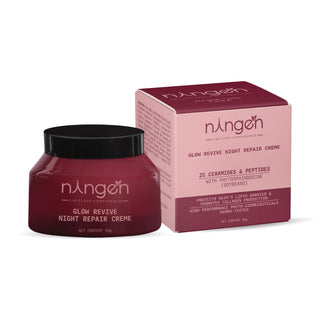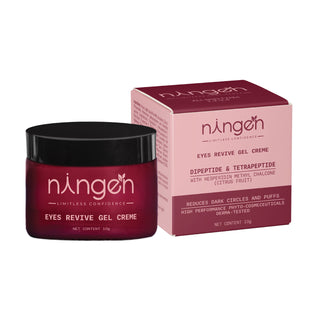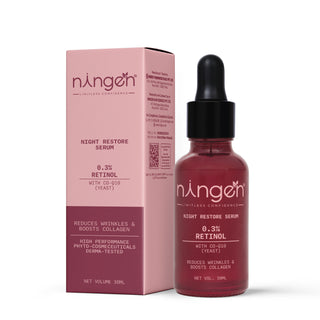Squalane: Where science meets skincare brilliance.
Imagine finding a skincare secret that feels like a silky veil of hydration, making your skin glow with youthful radiance. Meet squalane – the beauty world’s best-kept secret. From its magical moisturizing properties to its impressive versatility, squalane is the skincare hero you didn’t know you needed. Let’s uncover this in the article "Squalane For Skin: Benefits & Uses”
why this powerhouse ingredient is a must-have in your beauty arsenal and how it can revolutionize your skincare routine.
In This Article;
- What is Squalane?
- How is Squalane Derived?
- Benefits of Squalane For Skin
- How to Use Squalane in Your Skincare Routine
- Choosing the Right Squalane Product for Your Skin Type
- The Bottom Line
- TL;DR(Too Long; Didn't Read)
- Frequently Asked Questions
What is Squalane?
Squalane is a hydrating and moisturizing ingredient used in skincare products. It is derived from squalene, a natural oil found in both plants and animals, including human skin. Squalane is lightweight, non-greasy, and mimics the natural oils produced by our skin, making it effective in preventing moisture loss and suitable for all skin types.
Scientifically, Squalane (C30H62) is a saturated hydrocarbon obtained through the hydrogenation of squalene, a naturally occurring polyunsaturated hydrocarbon (C30H50). Squalene is found in high concentrations in the liver oil of sharks and plant sources such as olives, rice bran, and sugarcane. Hydrogenating squalene converts it into squalane, which is more stable and resistant to oxidation. Squalane functions as an emollient and antioxidant, helping to reduce trans-epidermal water loss (TEWL) and protect the skin barrier. Its biocompatibility and non-comedogenic properties make it an ideal ingredient for maintaining skin hydration and elasticity.
How is Squalane Derived?
Originally, squalane was harvested from shark livers, which contain a high concentration of squalene—the unstable form of squalane. However, due to ethical concerns and sustainability issues, the majority of squalane now used in skincare is derived from plant sources. Olives, sugarcane, rice bran, and amaranth seeds are common botanical sources of squalene, which undergo hydrogenation to become the stable, saturated form known as squalane.

The procedure transforms the unsaturated squalene into saturated squalane by adding hydrogen molecules, stabilizing the substance and making it less prone to oxidation. This results in a long shelf-life and makes squalane more suitable for skin care formulations. Moreover, plant-derived squalane is a preferred choice for environmentally conscious consumers and those prone to allergic reactions, as it is more eco-friendly and hypoallergenic compared to the shark liver oil counterpart.
Difference Between Squalane and Squalene
Although squalane and squalene may seem similar at first glance, key differences distinguish the two compounds. Chemically, squalene is an unsaturated oil that is susceptible to oxidation when exposed to air and UV radiation. Oxidative stress can turn it into a skin irritant, making it unsuitable for use in skincare products without modification.
On the other hand, squalane is a saturated and stable version of squalene. The hydrogenation process reduces the possibility of oxidative damage, which is beneficial for maintaining the skin's outer surface free from the effects of aging and environmental exposure. While both squalane and squalene are naturally occurring in the human body and aid in maintaining the skin's moisture and elasticity, squalane's shelf stability and non-comedogenic properties make it the preferred choice for skin care formulations.
|
Characteristic |
Squalene |
Squalane |
|
Stability |
Prone to oxidation |
Stable against oxidation |
|
Source |
Shark liver, plant oils |
Plant-derived, shark liver |
|
Skin Use |
Less common due to instability |
Common in skincare products |
|
Benefits |
Hydration, antioxidant |
Hydration, anti-inflammatory |
Who Needs Squalane?
Squalane is beneficial for anyone looking to improve their skin's hydration and texture. But it's especially useful for specific groups of individuals.
Individuals with Dry Skin: Squalane helps to lock in moisture, preventing dryness and flakiness.
People with Sensitive Skin: Its gentle, non-irritating formula soothes and hydrates without causing redness or irritation.
Aging Skin: Squalane's hydrating properties help to reduce the appearance of fine lines and wrinkles, improving overall skin elasticity.
Oily or Acne-Prone Skin: Despite being an oil, squalane is non-comedogenic and can help balance oil production, reducing the likelihood of breakouts.
Post-Treatment Care: Those recovering from dermatological treatments like chemical peels or laser therapy can use squalane to aid in skin healing and hydration.
General Skin Maintenance: Anyone looking to maintain healthy, hydrated skin can benefit from incorporating squalane into their skincare routine.

Benefits of Squalane For Skin
Deep Hydration:
Squalane is an excellent moisturizer that penetrates deep into the skin, providing long-lasting hydration without leaving a greasy residue.
Due to squalane's molecular structure being very similar to the skin's own, it is easily absorbed, helping to maintain the skin's barrier against environmental stressors such as UV radiation. Additionally, it partners well with other skincare ingredients such as hyaluronic acid, enhancing their benefits and efficacy. As squalane mimics the skin's natural oils, it penetrates deeply and efficiently. It helps prevent trans-epidermal water loss (TEWL), maintaining skin hydration levels.
Non-Comedogenic:
Squalane is lightweight and doesn’t clog pores, making it suitable for all skin types, including oily and acne-prone skin.
Squalane has a low molecular weight, which allows it to absorb quickly without blocking pores or causing breakouts.
Anti-Aging Properties:
Regular use of squalane can reduce the appearance of fine lines and wrinkles, promoting a smoother, more youthful complexion.
Squalane is an antioxidant that fights free radicals, reducing oxidative stress on the skin and preventing premature aging.
Improves Skin Elasticity:
Squalane helps to maintain skin elasticity, making the skin appear firmer and more supple.
By enhancing the skin's natural barrier function, squalane helps to retain elasticity and improve overall skin resilience.
Soothes and Calms:
Squalane has soothing properties that can help reduce redness and irritation, making it ideal for sensitive skin.
Squalane's anti-inflammatory properties help to calm and soothe irritated skin, reducing the signs of inflammation and sensitivity.
Enhances Skin Barrier:
Squalane strengthens the skin's natural barrier, protecting it from environmental damage and moisture loss.
By reinforcing the lipid barrier of the skin, squalane helps to protect against external aggressors like pollution and harsh weather conditions.
Antibacterial Properties:
Squalane has natural antibacterial properties that can help reduce the occurrence of bacterial skin issues.
Studies have shown that squalane can inhibit the growth of certain bacteria, helping to prevent infections and acne.
Versatile and Lightweight:
Squalane is a versatile oil that can be used on its own or as an ingredient in other skincare products, providing lightweight yet effective hydration.
Due to its stability and compatibility with a variety of skin types, squalane is often used in formulations to enhance the efficacy and feel of skincare products.
Promotes Even Skin Tone:
Regular use of squalane can help to fade dark spots and promote a more even skin tone.
Squalane's ability to enhance skin cell turnover and its antioxidant properties contribute to a more even complexion and reduction in hyperpigmentation.
Safe for All Skin Types:
Squalane is safe and beneficial for all skin types, including sensitive and mature skin.
Being a saturated and stable hydrocarbon, squalane is less likely to cause irritation or sensitivity, making it suitable for a wide range of skin types and conditions.

How to Use Squalane in Your Skincare Routine?
Incorporating squalane into your skincare routine can help enhance your skin's natural beauty and health. To effectively use squalane, it is best to apply it daily, either in the morning, the evening, or both, depending on your personal skincare regimen and skin's needs.
It can be used in multiple forms, including as a stand-alone oil, mixed into other skincare products, or found within the formulations of moisturizers, serums, and facial oils.
For optimal use, you should apply squalane after lighter products like toners and serums but before heavier creams or lotions. This allows for the squalane to penetrate the skin efficiently, locking in the moisture and benefits from previously applied products.
If used in the morning, ensure that it is followed up with a broad-spectrum sunscreen to protect against the damaging effects of UV radiation.
Choosing the Right Squalane Product for Your Skin Type
When searching for a squalane product, it's important to choose one that aligns with your skin type and concerns. Here is a simple table to guide you:
|
Skin Type |
Recommended Squalane Product |
Reasoning |
|
Dry skin |
Pure squalane oil or squalane-rich cream |
Maximizes moisture retention |
|
Oily skin |
Lightweight squalane serum |
Regulates natural oil production |
|
Sensitive skin |
Fragrance-free squalane oil |
Reduces potential for irritation |
|
Acne-prone skin |
Non-comedogenic squalane formulation |
Minimizes breakouts, light texture |
|
Aging skin |
Antioxidant-infused squalane blend |
Supports collagen production, fights free radicals |
Selecting Squalane Products for Different Skin Types
For hypersensitive or allergy-prone skin types, opt for products that are labeled hypoallergic to reduce the risk of reactions. Additionally, some squalane products blend in complementary ingredients like hyaluronic acid or antioxidants, catering to specific skincare needs such as hydration boosting or defense against oxidative stress.
Choosing Squalane by Skin Type:

- Lightweight: Does not clog pores.
- Non-irritating: Minimal risk of skin reactions.
- Moisture retention: Helps reduce the appearance of dryness.
- Anti-inflammatory: Calms skin redness and irritation.
- Compatibility: Blends well with other skincare ingredients.
- Ethical sourcing: Plant-derived options are available.
How to Add Squalane to Skincare Products?
Squalane is a highly versatile ingredient that can be easily incorporated into various skincare products. Whether you're formulating a new product or enhancing an existing one, here's a guide on how to add squalane to your skincare formulations:
Types of Products to Add Squalane:
Moisturizers: Squalane can be added to both lightweight lotions and rich creams to boost hydration and improve skin texture.
Serums: Include squalane in serums to provide an extra layer of moisture and enhance the serum's absorption properties.
Facial Oils: Create a standalone facial oil with squalane or blend it with other beneficial oils like jojoba or rosehip.
Cleansers: Adding squalane to cleansers can make them more hydrating and less stripping, suitable for all skin types.
Sunscreens: Incorporate squalane in sunscreens to improve the product's spreadability and add a moisturizing component.
Masks: Enhance hydrating and soothing masks with squalane to boost their moisturizing effects.
The Bottom Line
Hope you found this article “Squalane For Skin: Benefits & Uses” helpful. Squalane is a skincare powerhouse that offers deep hydration, improved skin elasticity, and a myriad of other benefits. Its versatility and compatibility with all skin types make it an essential addition to any skincare routine. Whether you have dry, oily, sensitive, or aging skin, squalane can help you achieve a healthy, radiant complexion. By incorporating squalane into your daily regimen, you can experience its remarkable moisturizing properties, anti-aging benefits, and soothing effects. Make squalane your skincare hero and enjoy the transformation it brings to your skin.
“Discover the beauty of squalane – for skin that loves to glow”.
Check out our curated selection of recommended Squalane and related products in the section below.
Quick View
Squalane is a deeply hydrating, non-greasy skincare ingredient derived from natural sources like olives. It mimics the skin's natural oils, providing moisture, improving elasticity, and offering anti-aging benefits. Suitable for all skin types, squalane helps maintain a healthy, radiant complexion by preventing moisture loss and soothing irritation.
Frequently Asked Questions
Q1. What is squalane?
Squalane is a hydrating and moisturizing ingredient used in skincare, derived from squalene, a natural oil found in plants and animals.
Q2. Why is squalane better than squalene for skincare?
Squalane is a stable, saturated version of squalene, making it more resistant to oxidation and suitable for skincare formulations.
Q3. What are the benefits of using squalane on the skin?
Squalane provides deep hydration, improves skin elasticity, reduces fine lines, and has anti-inflammatory and antioxidant properties.
Q4. Is squalane suitable for oily or acne-prone skin?
Yes, squalane is non-comedogenic and helps balance oil production, making it suitable for oily and acne-prone skin.
Q5. How do I incorporate squalane into my skincare routine?
Apply squalane after lighter products like toners and serums, but before heavier creams. Use it daily for best results.
Q6. What is the difference between squalane and other facial oils?
Squalane mimics the skin's natural oils, is lightweight, non-greasy, and suitable for all skin types, unlike some heavier facial oils.
Q7. Can squalane help with aging skin?
Yes, squalane's hydrating properties and antioxidant benefits help reduce the appearance of fine lines and wrinkles, promoting a youthful complexion.
Q8. Is squalane safe for sensitive skin?
Squalane is gentle, non-irritating, and suitable for sensitive skin, reducing redness and irritation.
Q9. What sources are used to derive squalane?
Modern squalane is primarily derived from plant sources like olives, sugarcane, and rice bran, though it was historically sourced from shark liver oil.
Q10. How does squalane compare to other moisturizers?
Squalane provides similar hydration benefits but is more lightweight and non-greasy, making it ideal for a wide range of skin types and conditions.
Q11. Is it Safe to Apply Squalane Alone?
Yes, it is safe to apply squalane alone on your skin. Squalane is a lightweight, non-comedogenic oil that mimics your skin's natural oils, making it suitable for all skin types. It provides deep hydration without clogging pores or causing irritation, making it a great addition to any skincare routine.











